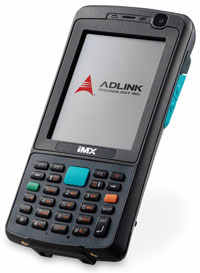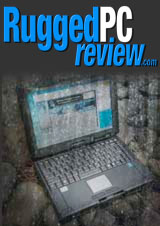Headquartered in Taiwan, ADLINK is a provider of a wide variety of industrial application platforms for embedded computing, measurement and automation applications. The company has almost 1,000 employees, and its products are available worldwide. while primarily known for its industrial computing modules, ADLINK also offers the IMX handheld computer platform (which was originally introduced in 2011 as the TIOT line).

The IMX Handheld Computer is a conventional keypad PDA measuring 3.15 x 6.4 x 1.2 inches and weighing around 13 ounces. That's still small enough to be carried around in most pockets. The device has a sunlight-viewable 3.5-inch resistive touchscreen display with QVGA (240 x 320 pixel) resolution. The 28-key phone-style numeric keypad includes programmable as well as navigation keys. There are also four keys on the side of the device for camera and scanner operation.
The TIOT handheld is a rugged device, able to survive 5-foot drops onto concrete and handle a wide operating temperature range of 14 to 140 degrees Fahrenheit. The device also carries IP65 sealing, which means it's totally sealed against dust, and can also handle low-pressure water jets from all directions.
For wired communication there's both USB host and client functionality, and RS232 serial connectivity. On the wireless side the device comes with 802.1b/g/n WiFi, Bluetooth Class 2 version 2.1, uBlox AGPS, and optional mobile broadband.
With availability of either a laser scanner or a 1D/2D CMOS imager as well as RFID, the TIOT is clearly designed to be a field data collection device.
While the IMX's form factory and technology is tried and true and does not break new ground, the platform does set itself apart in that IMX devices come both in Windows CE and Android powered versions with the same body but slightly different specs. The IMX-9000, shown here, is based on a 806MHz Marvell PXA310 processor, has dual cameras, uBlox AGPS, and 512MB of RAM, whereas the Android-based TIOT2000 uses an 800MHz Qualcomm 7227T processor, a single camera, Qualcomm GPSOne GPS, 256MB of RAM, and an OTG interface (USB On-The-Go).
In January of 2013, ADLINK changed the name of the TIOT-2000 to IMX-2000 because "the branding is changing to more closely link the product names with Industrial Mobile Computing." The TIOT-9000, likewise, was reissued (in April 2013) with the IMX-9000 name.



